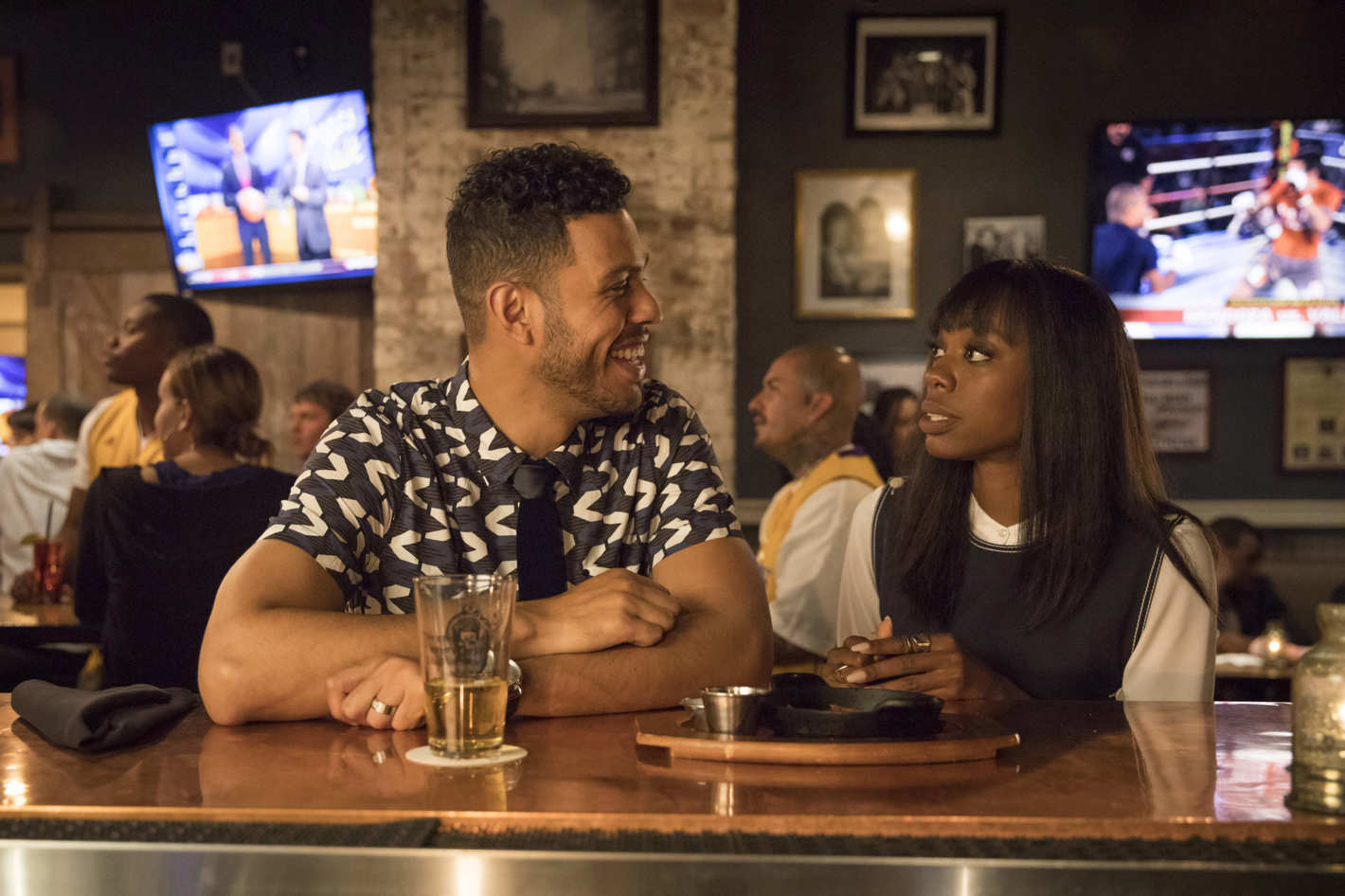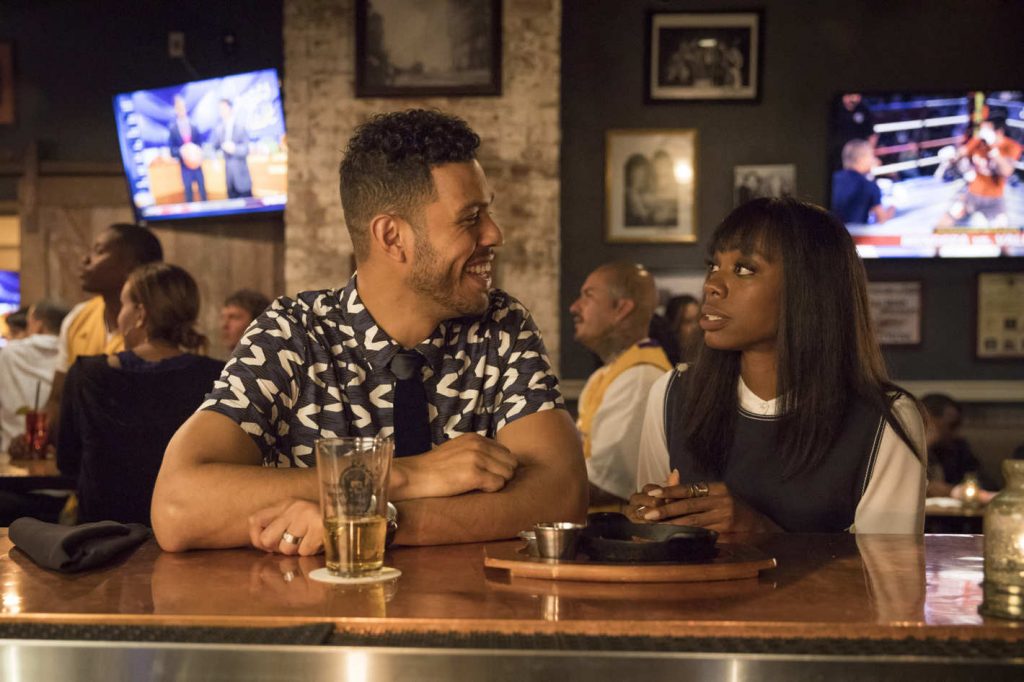“Oh Issa…I love you, I really do! But why are you playing us?!” This is something I’ve said to myself, off and on, while watching the second season of Insecure – the HBO hit comedy that continues to excite me every Sunday night.
For those of you unfamiliar with the half-hour series that premiered last fall, do not stress. I just hopped on the bandwagon myself — and before you write me off as late to the game – please note, I was simply waiting for the hype to die down. But that’s the thing, it hasn’t and for good reason too. Issa Rae, the show’s star and creator, is a freaking genius. Somehow, amid her YouTube fame, which has racked up more than 23 million views, and her New York Times bestselling book The Misadventures of Awkward Black Girl was published in 2015, she – along with creator Larry Wilmore – have spawned what is sure to be deemed a classic.
Rae has done what Sex and the City and Girls failed to do: Portray the complexity and hilarity of everyday life for women of color. If you haven’t watched it, you should know the writing is spot on. The dialogue between Issa Dee (played by Rae) and her BFF crew: Molly (played by Yvonne Orji), Tiffany (played by Amanda Seales), and Kelli (played by Natasha Rothwell) is nuanced and 110 percent relatable across all color lines. Same goes with the fellas.
However, Issa is pretty confused and flat out broken – which is what makes her so genuine. She’s trying to do right by her community while at the same trying to figure herself out. That, in itself, is why Issa can’t always grasp the error of her ways. Which brings it back to me, often yelling at the TV: “Issa, don’t front, we’re on the same team!”
Some people might assume Insecure is a black show, and it is. But it’s not just for black people. The show is so smart in the way it speaks volumes to how people of color get along today. It also puts our flaws and ignorance on full display. One of the topics that had the spotlight, particularly in season two, was the idea of minorities being racist against other minorities. Can we really be separate but equal?
Here’s a bit of how Insecure covers the complex dynamic among African-Americans, Latinos, and Afro-Latinos.
WARNING: The following list contains spoilers from both seasons of Insecure.
1
Issa plays dumb.
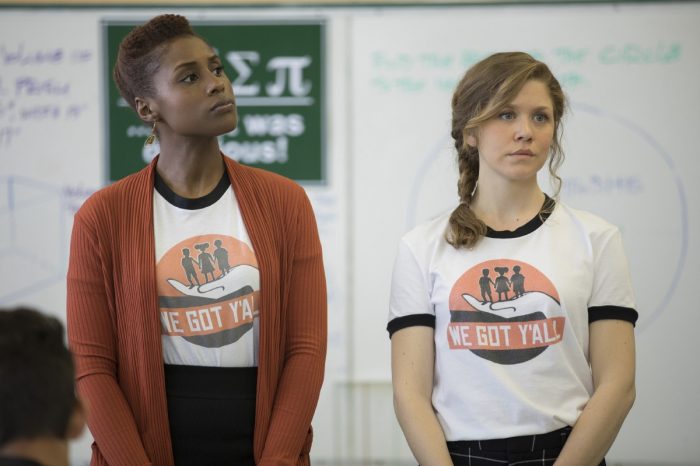
When we first meet Issa in season one, she works at a non-profit called We Got Y’All, that provides services to low-income schools in Los Angeles. Her job is to be inclusive, right? Issa’s fashion sense is completely socially aware so we assume she’s on top of the equality game. But then there’s a huge shift in the second season, primarily beginning in episode two. Now that Issa is single and ready to mingle, she’s sort of lost. And she seems to be taking it out on the Latino students she’s supposed to be working with. Yes, the kids might have given Issa a bad first impression – stealing food in the guise of wanting to join her after-school program might not have been the smartest thing to do, but regardless, they’re just kids.
The main agitator is Mr. Gaines (played by A. Russell Andrews), the black vice principal of the school, who’d like to resolve the scarcity of attendance of the We Got Y’All’s after-school program by inviting “their own.”
He’s clearly discriminating against the Latino students – just in case the “wall” joke didn’t give it away, and the only person that is advocating for them is Issa’s white co-worker Frieda (played by Lisa Joyce). Issa refuses to acknowledge Mr. Gaines exclusivity and offensive comments despite that the school has a majority Latino population. Issa just wants her program to succeed even if it means only the black students benefit from it.
2
Issa dates Nico.
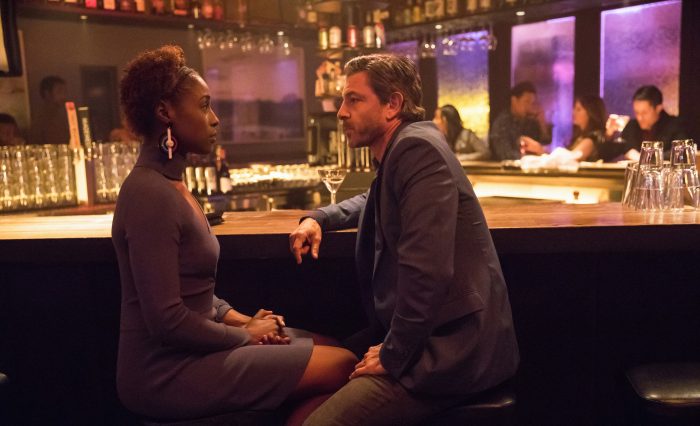
While Issa is busy exploring her Tinder options, she comes across Nico – an attractive sophisticated Latino with grayish hair. But Nico isn’t meant to be “the one” which ends up being news to him later on in the sixth episode. Nico wants to actually date Issa. Issa, though, just wants to bang.
She doesn’t take him seriously at all, which is so sad. She sees him as a hot Latino man and possibly a good lay, but nothing more. It’s so disappointing to hear Issa resorting to offensive stereotypes. When Issa shows Nico’s Tinder profile to Molly, her BFF asks, “He’s Latino?”
“Sí, bitch” Issa says. Okay, not terrible, but then Issa proclaims excitement for her desired conquest by throwing in a mariachi grito. Ugh! Issa quickly corrects herself and says: “That was really racist.”
Later, during their date, while Nico asks Issa what she’d like to drink, Issa’s inner dialogue goes off by saying: “Fuck gin. I want horchata easy on the chata, heavy on the whore.” Thankfully she didn’t say that out loud. We never even find out where Nico is from. He appears to be South American, but in her interactions with him she uses Mexican cultural references as a sort of shorthand for “generic Latino.”
He truly tries to connect with her on a human level, but Issa isn’t looking for a real connection. Not yet anyway. Nico doesn’t take her crap for very long, so that’s likely the last we’ll see of him.
3
Molly and Dro.

Unlike Issa, her best friend Molly has no qualms about befriending Latinos. That’s likely due to the fact that she grew up with Dro (short for Alejandro). He’s her Afro-Panamanian neighbor and homie who has the stature of a basketball player (actor Sarunas J. Jackson used to be one in real life) and the charisma to match.
Because Molly and Dro go way back, their chill relationship is quite seamless and pretty much picture perfect. That’s until the two hookup. Did I mention he was married? But Dro’s not a player – not technically. You see, he’s actually quite progressive when it comes to monogamy, meaning he doesn’t believe in it, and neither does his wife. His open marriage makes the relationship with Molly sort of complicated – more for her than for him, because she’s getting attached.
We also meet Dro’s mom and dad in episode five (played by Carlos Carrasco and Angela Elayne Gibbs.) Not only do they speak Spanish, but Molly speaks Spanish too and quite fluently.
One interesting aspect about this revelation is the fact that Issa hardly discusses with Molly what’s going on with the Latino kids at her workplace. Perhaps Molly would give her a reality check, one that Issa isn’t ready to face.
4
Is Issa racist?
Issa does not confide her misgivings about the school’s anti-Latino principal to Molly or to hardly anyone for that matter. That’s mostly likely because she doesn’t want to hear the truth. She does, at one point, talk to her brother in episode five, about her “self-righteous” co-worker that is accusing her of “leaving out all the Latino kids” from joining the after-school program. This hilarious exchange between the two is cut short because Issa is figuring out that she is, in fact, being discriminatory against them and favoring the black students just to see her program succeed.
5
Issa sees the light.
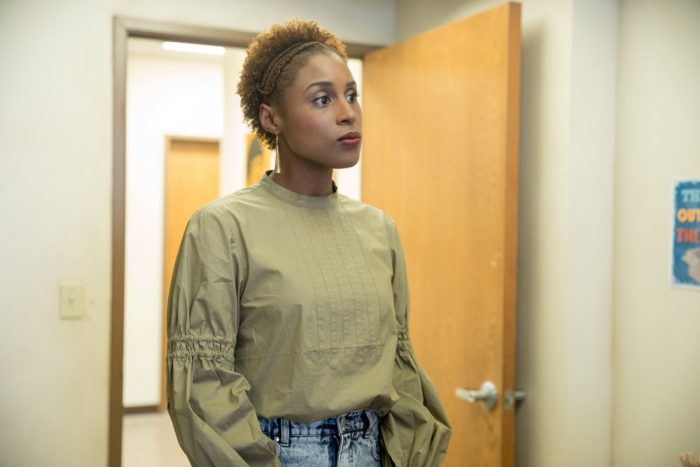
For most of season two, I am waiting and hoping Issa will come to the realization that we’re all in the same boat. We’re all struggling and trying to figure shit out just as much as she is. When she crashes her car (after being distracted by a dick pic) and has to take the bus to work, she comes across one of the Latino students from her school. He was in the group that stole the snacks from the library while Issa and Frieda introduced the after-school program.
The turning point comes in the seventh episode when Issa sees the Latino student pull out a PSAT book from his backpack while they’re on the bus. He’s not some random bad kid as she assumed he was. The two get to talking about the test and Issa finds out that Mr. Gaines told the Latino kids that the after-school program was at capacity and they didn’t have space for them. Issa realizes that not only did Mr. Gaines discriminate against the Latino students, but that she, too, was a participant.
Issa apologizes to Frieda for benefiting from Mr. Gaines’ racist ways, and admits she was “in a weird place for a minute.”
She also confronts Mr. Gaines about his exclusion of the Latino students, which he laughs off. But Frieda and the students witness the exchange and while nothing comes from this call out, there’s a big moment of relief for the Latino audience: “Yes, Issa, we’re all on the same team.”



